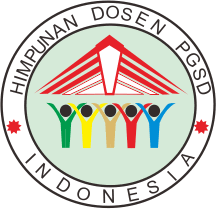Analisis implementasi gerakan literasi sekolah (gls) di sekolah dasar ditinjau dari social learning theory
Abstract
This study aims to analyze the implementation of the School Literacy Movement (GLS) at SDN Kemasan 1 Surakarta from the perspective of Albert Bandura's social learning theory. The approach used is descriptive qualitative with data collection techniques through observation, interviews, and documentation. The informants in this study consisted of the school principal, literacy coordinator, classroom teachers, and students from lower and upper grades, with a total of 5 respondents selected through purposive sampling. Data validity was tested using source and technique triangulation to ensure the validity and credibility of the findings. The results of the study indicate that literacy activities in this school have been effective and reflect the four main aspects of social learning theory: attention, memory, reproduction, and motivation. Students demonstrate high attention through varied literacy methods, information retention through meaningful activities, the ability to reproduce behavior through practical application, and enhanced motivation through teacher reinforcement. This research implies that social learning theory can serve as a theoretical framework for designing social interaction-based literacy programs that not only build cognitive skills but also the character of students. Practically, these results can be used as a basis for developing literacy strategies by teachers and social-based literacy policies by schools.
Keywords
References
Rohman, A. (2022). Literasi sebagai Cermin Kualitas SDM. Jurnal Pendidikan Humaniora, 10(1), 40–50. [2] Zakiyah, L., Kurniawan, R., & Astuti, D. (2024). Usia Ideal Literasi Anak. Jurnal Pendidikan Anak Usia Dini, 8(1), 71–79. [3] Firmansyah, A., & Bintoro, R. A. (2023). Gerakan Literasi Sekolah dalam Perspektif Pendidikan Karakter. Jurnal Pendidikan Indonesia, 12(1), 78–91. [4] Mirnawati, N., & Fabriya, A. (2022). Strategi Meningkatkan Minat Baca melalui Program GLS. Jurnal Literasi Pendidikan, 3(2), 22–38. [5] Fadlilah, U., Handayani, S., & Pratiwi, R. (2024). Pengaruh Literasi terhadap Keterampilan Sosial Peserta didik. Jurnal Pendidikan Karakter, 14(2), 174–185. [6] Bandura, A. (1977). Social Learning Theory. Englewood Cliffs: Prentice-Hall. [7] Warini, T., Suprapto, H., & Nurani, Y. (2023). Social Learning Theory dan Implementasinya dalam Pembelajaran. Jurnal Pendidikan Sosial, 7(2), 566–576. [8] Miles, M. B., & Huberman, A. M. (2014). Qualitative Data Analysis: A Methods Sourcebook (3rd ed.). Thousand Oaks: SAGE Publications. [9] Boiliu, P. (2022). Peran Model Sosial dalam Pembelajaran Bahasa Indonesia. Jurnal Bahasa dan Sastra, 10(2), 88–97. [10] Ansani, & Samsir, H. M. (2022). Teori Pemodelan Bandura. Jurnal Multidisiplin Madani, 2(7), 3067–3080. https://doi.org/10.55927/mudima.v2i7.692 [11] Koh, L., & Hulbert, C. (2023). Positive Reinforcement and Peer Motivation in Early Literacy. International Journal of Educational Psychology, 12(3), 200–213. [12] Mubin, M., Hidayati, F., & Nugroho, D. (2023). Retensi dan Pemahaman Bacaan melalui Diskusi Tematik. Jurnal Ilmu Pendidikan Dasar, 8(2), 112–120. [13] Jayana, T. A., & Muhlis, A. (2021). Konsep Belajar dalam Perspektif Anwar Muhammad al-Syarqawi dan Albert Bandura serta Implikasinya dalam Pembelajaran di Sekolah. Jurnal Al-Murabbi, 7(1), 31–44. https://doi.org/10.35891/amb.v7i1.2716 [14] Susianti, R., Lestari, A., & Pramono, R. (2021). Dampak Implementasi Gerakan Literasi Sekolah pada Sikap Peserta Didik. Jurnal Ilmu Pendidikan, 3(1), 55–63. [15] Inawati, I., & Hambali, Y. (2024). Penerapan GLS untuk Menunjang Kemampuan Literasi Peserta Didik. Jurnal Literasi Dasar, 5(1), 50–66.
Refbacks
- There are currently no refbacks.



